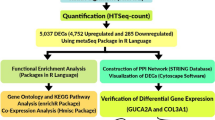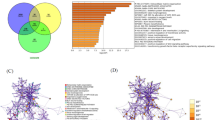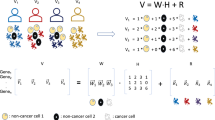Abstract
Identifying genes whose differential expression affect the survival of patients after primary tumor surgery is a major aim of clinical cancer research. To address this issue we combined rapid bioinformatic search algorithms with quantitative RT–PCR in a panel of clearly defined cases of colorectal carcinomas with detailed patient histories. Search algorithms were written that identified Expressed Sequence Tags (ESTs) from the Unigene EST collection of putative open reading frames (ORFs). Expression ratios of healthy to cancerous tissue of each Unigene ORF were calculated. The first 35 candidates arising from bioinformatic searches were examined for mRNA expression in a panel of 20 well documented cases of colon cancer. Four of these 35 genes showed significant correlations with histopathological parameters. Therefore, their expression was further analysed by quantitative RT–PCR in a larger patient cohort. Kaplan-Meier/log rank statistical tests of up to 49 patients in three of the four genes demonstrated significant association of gene expression with poor survival. All four genes demonstrated a strong association with metastatic tumor progression. Expression of the genes was localized to epithelial cells by in-situ hybridization.
This is a preview of subscription content, access via your institution
Access options
Subscribe to this journal
Receive 50 print issues and online access
$259.00 per year
only $5.18 per issue
Buy this article
- Purchase on SpringerLink
- Instant access to full article PDF
Prices may be subject to local taxes which are calculated during checkout

Similar content being viewed by others
References
Boguski MD, Schuler GD . 1995 Nat. Genet. 10: 369–371
Gazelle GS, McMahon PM, Scholz FJ . 2000 Radiology 215: 327–335
Halaschek-Wiener J, Wacheck V, Schlagbauer-Wadl H, Wolff K, Kloog Y, Jansen B . 2000 Mol. Med. 6: 693–704
Kim JC, Kim WS, Ryu JS, Oh SJ, Lee DH, Koo KH, Roh SA, Kim HC, Yu CS, Kang GH, Bodmer WF . 2000 Cancer Res. 60: 4825–4829
Lal A, Lash AE, Altschul SF, Velculescu V, Zhang L, McLendon RE, Marra MA, Prange C, Morin PJ, Polyak K, Papadopoulos N, Vogelstein B, Kinzler KW, Strausberg RL, Riggins GJ . 1999 Cancer Res. 59: 5403–5407
McLeod HL, Murray GI . 1999 Br. J. Cancer 79: 191–203
Schneider F, Kemmner W, Haensch W, Franke G, Gretschel S, Karsten U, Schlag PM . 2001 Cancer Res. in press
Schmitt AO, Specht T, Beckmann G, Dahl E, Pilarsky CP, Hinzmann B, Rosenthal A . 1999 Nucleic Acids Res. 27: 4251–4260
Steinberg SM, Barkin JS, Kaplan RS, Stablein MD . 1986 Cancer 57: 1866–1870
Verdecchia A, De Angelis R, Capocaccia R, Sant M, Micheli A, Gatta G, Berrino F . 1998 Int. J. Cancer 77: 322–329
Acknowledgements
We wish to thank Mrs S Grigull and I Wendler for excellent technical assistance. This study was supported by a Klinisches Kooperationsprojekt between MDC and the RRK. The MDC bioinformatic work was funded as part of the MEDSEQ program of the German human genome project.
Author information
Authors and Affiliations
Corresponding author
Rights and permissions
About this article
Cite this article
Brett, D., Kemmner, W., Koch, G. et al. A rapid bioinformatic method identifies novel genes with direct clinical relevance to colon cancer. Oncogene 20, 4581–4585 (2001). https://doi.org/10.1038/sj.onc.1204610
Received:
Revised:
Accepted:
Published:
Issue date:
DOI: https://doi.org/10.1038/sj.onc.1204610
Keywords
This article is cited by
-
Sprouty-2 controls c-Met expression and metastatic potential of colon cancer cells: sprouty/c-Met upregulation in human colonic adenocarcinomas
Oncogene (2010)
-
An integrated approach for the systematic identification and characterization of heart-enriched genes with unknown functions
BMC Genomics (2009)
-
Comprehensive Cancer Centres and the war on cancer
Nature Reviews Cancer (2001)



